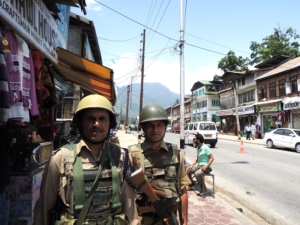The Lack of Internet Access as an Attack on Kashmir
 Around 43% of the population in India has internet access. Unfortunately, internet access growth has paused due to economic issues and tight government restrictions. The government usually cuts internet access for “elections, protests, religious festivals and examinations.”
Around 43% of the population in India has internet access. Unfortunately, internet access growth has paused due to economic issues and tight government restrictions. The government usually cuts internet access for “elections, protests, religious festivals and examinations.”
The shutdowns are all over the country but mostly affect the poorer regions of India. Internet access plays a major role in the economy and education equality. The regions that lack stable and affordable internet access face issues such as students dropping out of school, alongside other economic challenges.
Additionally, reports suggest that regions that do not support the Bharatiya Janata Party (BJP) ruling party suffer restricted internet access. According to these reports, the Kashmir region faces other human rights abuses and the lack of internet access only emphasizes the economic inequalities that other marginalized Indian communities experience.
Understanding the Conflict
Kashmir is a disputed territory between India and Pakistan. The region has witnessed numerous violent rebellions. In 2019, the region was reconstituted as two union territories, Kashmir and Jammu, under Indian control. With an increasingly Hindu nationalist country, tensions have heightened due to the majority Muslim population in Kashmir.
Many residents lost a substantial amount of political and civil rights when India gained control over the area. This event resulted in the emergence of opposition and rebellion. The past five years have been marked with violence from anti-Indian separatists, Jihadist rebels and Indian security forces. And the Indian government, BJP, has been training and arming militias to fight “anti-Indian insurgencies,” but it has also been attacking the rebel Kashmir region by cutting off internet access.
Impacts
India has imposed internet shutdowns throughout the country and Kashmir has experienced the majority of these disruptions. The BJP justifies these shutdowns as security measures to combat the ongoing rebellion. Recently, the region endured an 18-month internet shutdown, which further aggravated frustrations. These shutdowns have resulted in human rights violations, hampering communication among residents and limiting access to external information. Journalists have faced challenges in fact-checking and reporting, often having to leave the area.
The 18-month shutdown took an economic toll on the area and its residents. Hospitality services were not able to receive any bookings and had to rely on loans from friends and families to maintain regular bills and payments. The ongoing shutdowns all over India have already cost the economy around $600 million.
Although there has been a restoration of internet access to Kashmir, the region still faces intermittent shut-downs in conjunction with slow and limited access. India has faced backlash from countries, like the United States (U.S.), for allowing human rights violations. But even in the face of such criticisms, internet shutdowns are still prevalent, especially in Kashmir.
Positive Updates
India has made stronger commitments to human rights, with the Supreme Court ruling that access to the internet is a fundamental right. Notwithstanding, the government has yet to cut down the internet shutdowns. However, pressure from other countries and international communities might continue to push India forward in protecting human rights.
A joint letter was published in 2019 on Access Now, calling for India to keep the internet “open and secure” in Kashmir and surrounding areas. This letter was signed by over 20 international organizations to encourage the Indian government to return internet access to the area. Many Indian groups from the ‘#Keepiton Coalition’ have spoken out about the lack of internet access in Kashmir and Jammu.
Looking Ahead
In 2021, some internet access was upgraded to 4G after the Indian Supreme Court, the Apni Party leader, the National Conference president and even some members of Modi’s party, the Bharatiya Janata Party, called for the restoration of 4G internet. Kashmir is slowly rebuilding after the devastation of COVID-19 and the lack of internet access. And as a result, several schoolchildren are finally able to continue their schooling.
– Kathryn Kendrick
Photo: Flickr
